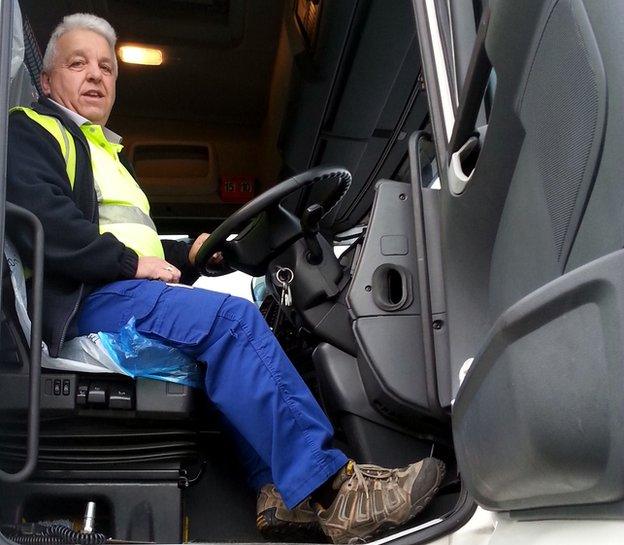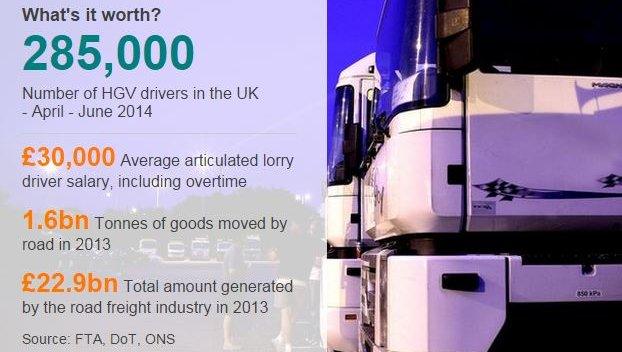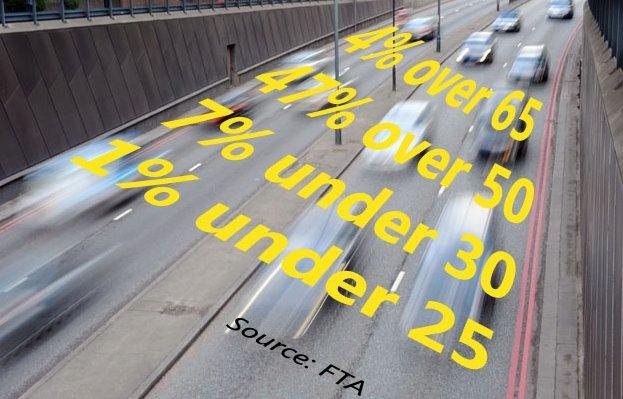Lorry driving: The logistics of keeping logistics on the road
- Published

Mel Gwyn worked his way up to the "big artics" from driving "3.5 tonners" on building sites
Facing an unprecedented shortage of lorry drivers the UK haulage industry has this week asked the government for support to help recruit and train new blood. But what is being done in the meantime to keep our shop shelves stacked and our parcels delivered?
As long as he keeps on passing the fitness test, Mel Gwyn will be driving lorries.
At 56, he personifies an industry that is experienced but top heavy, with nearly half of drivers on domestic routes aged over 50.
In the past five years, HGV licence applications have dropped by more than 32,000.
The cost of getting the licence is putting potential young drivers off.
Those left consist of mostly older drivers changing careers, with more than 13,000 working truckers already aged over 65.
The Freight Transport Association (FTA) estimates 45,000 new recruits are needed to keep the industry from grinding, literally, to a halt.
Already there are delays, especially at busy times such as Christmas. Eventually production lines will be hit and supermarket shelves will go un-stocked, the FTA says.
"Those beer barrels need to be delivered by someone," a spokeswoman warns.
What's it worth?
285,000
Number of HGV drivers in the UK - April - June 2014
-
£30,000 Average articulated lorry driver salary, including overtime
-
1.6bn Tonnes of goods moved by road in 2013
-
£22.9bn Total amount generated by the road freight industry in 2013

The situation was made worse last September when experienced drivers left en-masse rather than bother with the new Certificate of Professional Competence.
Faced with 35 hours of training every five years many drivers nearing retirement age threw in the towel.
"I think some had thought it might just go away," says FTA regional head of policy, Natalie Chapman.
Some companies, like Ferguson's Transport in Cramlington, helped staff comply, but even they lost drivers.
"If you're someone who's approaching retirement age, to be told that you've got to have a bit of paper, that you've got to go and sit in a classroom for a week to do the job you've done for the last 40 years of your life, they don't take it very well," owner Alan Ferguson says.
Last Christmas, when the industry relied on self-employed and agency staff to cover the extra traffic, the loss of drivers and delays in compliance prompted the FTA to warn deliveries were at risk.
Agencies turned down jobs because they did not have enough staff with the right paperwork, Ms Chapman says.

Strong winds in January overturned a number of lorries, including one blown over on the Clackmannanshire Bridge over the Firth of Forth
Qualifying as a trucker takes too long and is too expensive to happen by accident so "you've got to want to do it", Mr Gwyn says.
When he starts telling stories it is clear his job remains a pleasure to perform.
He describes pallets of envelopes so light they are like "carrying fresh air" and the equally light empty trucks, which can be toppled by wind.
"If it's going to go, it'll go," he says. "You cannot fight it. The wind just gets it and it's like a sail."
Removing the "sail", by tying back the canvas sides, allows the wind to pass through the trailer, but that creates another problem.
One driver arrived at the Nissan car factory in Sunderland completely oblivious his roof had been blown off, Mr Gwyn says. They never found it.
Off-road facilities also pose problems, with parking facilities often full, expensive and insecure.

"Anyone can wander around the trucks and there's actually quite a lot of issue around truck crime, so theft of loads, fuel theft, stories of drivers being attacked," Ms Chapman says.
And, qualifying for the licences required to drive articulated lorries will set new drivers back at least £3,000 - even if they pass first time.
"That's a lot of money for anybody," says Allan McNaught, centre manager at Tyneside Training Services (TTS), which teaches new drivers.
There are no student loans for this and, even if an 18-year-old could afford the training and the licence, they still need an employer "willing to take the risk on a young person, with no experience and no background", Mr McNaught says.

Lorry cabins have moved on since the days drivers slept in a hammock strung in the back
They also face insurance companies, which insist drivers under 25 have two year's HGV experience.
The FTA is fighting this claiming that, unlike car drivers, there is no evidence younger HGV drivers are more of a risk.
It is also pressing the government for vocational loans and training grants. The treasury says it is considering their proposals.
Meanwhile, it is increasingly falling to employers to nurture the new drivers they will eventually depend on.
To "protect its own position", Ferguson's has started a scheme to recruit ex-army drivers and launched an apprentice scheme in partnership with TTS, says human resources manager Andrew Muxworthy.
More used to teaching middle-aged career-changers, TTS centre manager Mr McNaught thinks it is "quite a challenge" for the industry to bridge the age gap.

Could shelves be left empty because potential young drivers find shelf stacking pays better?
"I think there's always been more attractive industries for young people to come into at 16 or 17, when they're leaving school," he says.
"Because the wages have been perceived as quite low you could, instead of delivering goods to Asda or Tesco, actually stack the shelves and probably earn as much, if not more."
One of the scheme's successful applicants, Anthony Doherty, from North Tyneside, personifies how easily the industry can fail to snare potential recruits.
"My dad does it and I've always loved lorries," the 20-year-old says. "It's definitely what I want to do."
Yet, despite this, he ended up working for HM Revenue and Customs. It was only redundancy and Ferguson's new training programme that forced his hand.
Without the scheme, funding the licence would have been unthinkable.
"The only way out is significant investment from businesses like ours," says Mr Muxworthy.
"We have an ageing workforce. This is not a Ferguson's issue, it's an industry issue."
Related topics
- Published14 June 2015

- Published14 January 2015

- Published18 August 2014

- Published20 March 2013

- Published16 November 2011

- Published10 November 2011
- Published10 September 2009